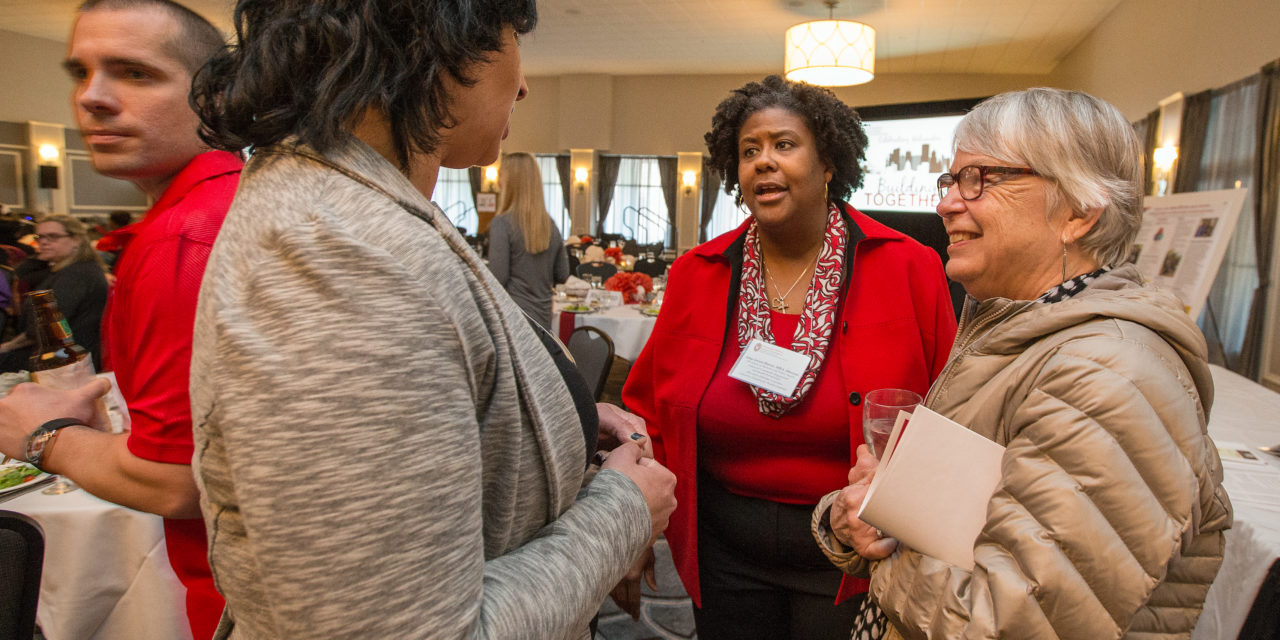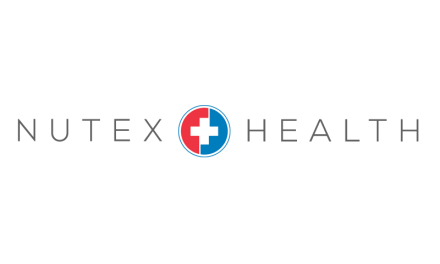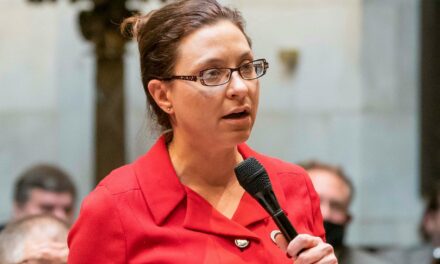
Lifecourse Initiative for Healthy Families works with communities to address infant mortality

Image: Gina Green-Harris, center, talks with University of Wisconsin School of Medicine and Public Health and community partners in Milwaukee in March. Image courtesy of the UW School of Medicine and Public Health.
Wisconsin has some of the highest rates for African-American infant mortality in the country, a disparity that can have large impacts on the state, according to Lifecourse Initiative for Healthy Families Director Gina Green-Harris.
“It may start with a baby, but we know the health of our country, the health of our communities is dependent on how healthy our babies are and how we grow through the life course,” she said.
The Lifecourse Initiative has been addressing infant mortality in the state for almost 10 years. Green-Harris recently spoke to Wisconsin Health News along with Samantha Perry, project manager at the Racine Kenosha Community Action Agency and Pat Batemon, collaborative coach for the initiative. Edited excerpts are below.
WHN: In January, the Centers for Disease Control and Prevention issued a report showing that Wisconsin had the highest rate of infant mortality for African-Americans in the nation. What’s led to that?
Gina Green-Harris: It has a lot to do with our racial and economic issues, our challenges, our social constructs. We have some of the highest poverty rates here in Wisconsin. Some of the poorest access to healthcare is again an issue, and a chronic issue for us. Poor housing, transportation. All of those things impact a woman’s life, but also family, stability. That’s life course. When we talk about the issue of infant mortality, it starts before a woman gets pregnant. It’s all about what happens through the course of that women’s health even before the issue of bearing a child. Given what we are suffering here from in Wisconsin, you look at lead issues, you look at issues around food deserts, you look at a a lot of the structural pieces that are in place, those things also support the poor birth outcomes of moms in our state.
Samantha Perry: As it pertains to a lot of the information out there in terms of the fetal infant mortality review, oftentimes people are thinking that a lot of the deaths are related to sleep conditions when over 50 percent of the deaths are attributed to preterm births, so that’s a baby being born too soon. Oftentimes when they’re born too soon, they’re also born too small. Then the next level of that is what’s causing women, black women in particular, to go into labor sooner than they need to. So a lot of things that Gina mentioned as far as a lot of the economic factors, if you tie all of those things under one bow, it’s really stress. So you think about housing and issues with housing, that creates stress. If you think about issues as they relate to where you live, where you work, where you play, or even where you pray, they’re all tied into stress. And stress has a real physiological effect on a body.
WHN: What is your approach to address this issue?
Pat Batemon: The Lifecourse Initiative is funded through the Wisconsin Partnership Program. It’s about 10 years old. We have collaborative efforts that are across three communities in Racine, Milwaukee and Kenosha. In each of those communities, the Lifecourse Initiative is using a collaborative community impact model. All three of those initiatives are led by a backbone agency. In Racine, it’s spearheaded by the Racine Kenosha Community Action agency. In Milwaukee, United Way of Greater Milwaukee and Waukesha is the backbone agency. In Kenosha, it’s the Kenosha health department. Each of those three communities getting started with their collaborative effort have brought together partners across their communities and have really worked on a community action plan that they’ve developed together to focus on. Racine has selected breast feeding and adolescent health as their action agenda item to focus on. Kenosha has selected maternal mental health and housing, and Milwaukee is focusing on prematurity and prevention. Each of those collaboratives meet on a monthly basis and they work together, focusing on policy, system and environmental efforts and strategies.
WHN: How has Racine approached this?
Perry: In 2011, we released our community action plan. Some of the key things that the community said was number one, start with the youth. Because they’re youth now, but they’re the soon-to-be parents as you think about the life course. Also make sure that there’s a place for fathers and that fathers are supported. A lot of the strategies along the way that have come out of the work of the collaborative have impacts on other parts of the life course, Baby Express being the first one that address the transportation issue for families that are pregnant. Home Visiting Network is another strategy that addresses evidence-based programming to make sure that people are getting their support during pregnancy and afterward. Sister Friends, which is through The Birthing Project, is another social support strategy that was already existing. We were able to better connect with it as well as Focus on Fathers through the Racine YMCA…We’re looking at a bunch of different factors. If you literally drew a horizontal line and then plot it out: conception, five years, puberty, pregnancy, looking at strategies that plot along that line. So breastfeeding is our current strategy we’re focusing on as well as improving adolescent health.
WHN: What’s happening in Milwaukee and Kenosha?
Batemon: Each of our three communities is doing something to involve fathers. Milwaukee has committees that are looking at their strategies. So they do have a strengthening African-American fathers committee, and one of the things that they’re doing is barbershop conversations where they’re trying to educate fathers about infant mortality, about pregnancy. The first event was at the Milwaukee Fatherhood Initiative that’s held annually in October. From that, what they’re doing now is that they are developing videos and talking points that they can present across other organizations that are working with fathers to show as an educational piece across the community. The other thing that Milwaukee is doing is that they have a community engagement coordinator. One of the things that she has developed is what we call Life 365. She is working directly with moms. When you talk about stress, one of the components that they’re doing is an exercise with mom and baby, and it’s also an opportunity for women that are coming to that monthly event to talk with one another about stress and issues involved with parenting. They also are doing their Strong Baby campaign in conjunction with the health department and the mayor’s office. This is the second one of the year, and they will do four for the year. Those have been initiated on bus terminals across the city. They also are working with faith-based organizations. So they’re working with Strong Baby Sanctuary and Julia Means, She’s had some great successes working with moms and with her around parenting and pregnancy. She hasn’t had one mom that’s lost a baby in her program. Her program is being recognized and folks across other states want to replicate that model.
In Kenosha, they’re strengthening fatherhood involvement with the (Special Supplemental Nutrition Program Women, Infants, and Children) program and working with dads who have come through the WIC program across Kenosha and Racine. That project started out through WIC. It was one of Life’s one-year grantees. That has evolved into a full-time position for the fatherhood involvement for Sharmain Harris because he was very successful in recruiting and working with dads. The work of that has been recognized across the state as well as across the country. And they do the home visiting program. They have a couple of programs that they offer in Kenosha, one that is particularly focused on African-American parenting and also that’s an evidence-based curriculum. And then they also do the home visiting program where they have health navigator that works directly with moms too. Their focus is on maternal mental health. And one of the things that they’ve been focusing on is trying to bring together a referral base for moms to seek treatment around maternal depression.
WHN: What’s involved with the regional working group?
Batemon: We went through a process and looked at areas to focus on at the regional level. The group selected perinatal depression screening. As a result of that, we’ve been coming up with strategies and what we can do to address that issue regionally, across the state. One of the ways that we’re planning to do that is to first look at reducing stigma related to perinatal depression. What that will involve is that we’re going to plan to have community conversations about perinatal depression and from that develop a campaign that we can issue across our three communities to help try to reduce and eliminate stigma related to that. Secondly, what we hope to do after our campaign is really work with our partners across the state and look at a quality improvement effort, looking at screening for depression. Thirdly, what we want to do is to work with champions across our three communities that can help us really eliminate and reduce some of the stigma related to that. We’re hoping to do that with our faith-based community folks across the three communities.
WHN: Who else needs to involved in this effort and what else needs to be done?
Perry: Healthcare professionals really do need to be involved. I say that knowing that they are on the front lines, working with families especially as they come for prenatal care and other visits, but their involvement and some of their feedback is key. However, I also believe that the feedback and the involvement of the black community is even more important. I think that what tends to happen sometimes is that as collaborative and hot topics take root in the community, everyone is involved, everyone is engaged. And then when another topic comes along it tends to take some of the individuals off in a different direction. I think the ability to which we can have black families, who are involved in providing input and direction, having our healthcare professionals at the table as well as having politicians who listen and actually do something as it relates to improving the environment for families. One of the things that we know is that the health of an infant, the health of children is a real kind of smoke signal of what’s going on in a community. So if children are not healthy, babies, infants, toddlers, if they’re not healthy, that’s a serious, serious issue for a community.
Batemon: One of the things that we have done last year was really bring someone in around policy to help us kind of look at how we can address this issue with our legislators. Last year in July, we brought in former Sen. Shannon Jones from Ohio. Ohio last year passed a major infant mortality bill that was done on a bipartisan effort that was led by Jones, who is a Republican. We brought her in to really help around messaging and really help us to try and understand what it takes to do that on a bipartisan level. As you know in Wisconsin, the Legislature is led by Republicans. One of the key things to address around that is to really think about the numbers of infant mortality and see it as a black community issue but address it from an economic perspective and how that can impact all communities and even those communities that are not impacted by infant mortality numbers. It was very critical and very helpful to us and we’re still looking at how we can garner a legislative champion around this issue.
Green-Harris: I think from a perspective of what Life Course would do is to look at champions not only in the legislative world, but in the health policy world as well and in the health world. Physicians are seeing this. The clinicians are seeing it, but also coming forward with solutions. I think that’s huge. Ohio is a model state for us. They have done things legislatively that have been able to drive things locally for change in programs, policies, big P, small P. So we can look at those kinds of states. Michigan is doing great work in infant mortality, so we’re trying to figure out what’s working. We need to look at evidence-based programs that work. We need to look at those kinds of interventions, not just for one stage of life but for health overall. I think the other big thing we have to start looking at is truly talking about going upstream and addressing the social determinants of health. The only way we’re going to get through this crisis is by addressing the issues that we’ve been sweeping under the carpets for years, one of them being the social determinants of health, which is standby racism. And we have to begin to use that word in health inequities. I think that’s huge for us. It’s important that we look at all of those social constructs that have been in place for years and begin to start talking about how do we break some of these barriers and how do we begin to address them so we create new systemic opportunities for our communities. We know the reality is that you don’t undo 200, 300, 400 years of racism. It doesn’t work that way. But what we can do is start chipping at it and start really tackling the root cause and stop band-aiding our circumstances and situations. I think that’s going to be critical to us.
This article first appeared in the Wisconsin Health News daily email newsletter. Sign up for your free trial here.





